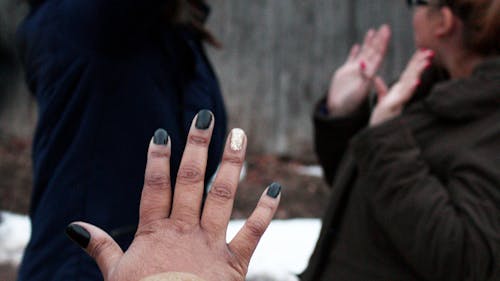Students learn sexual violence prevention, intervention strategies

During the University’s New Student Orientation program for first-years, presenters strive to educate incoming students about bystander intervention. In a new eight-dose program, faculty members are educating current students about how to be engaged in the Rutgers community.
The third and fourth “doses” of the Office of Violence Prevention and Victim Assistance’s program, “SCREAMing to Prevent Violence,” encouraged students to not be bystanders last night at the College Avenue Gymnasium.
Organized in conjunction with Rutgers Recreation, the program strives to take an in-depth approach to educate students about preventing sexual violence in the Rutgers community, said Laura Luciano, assistant director of the Office of Violence Prevention and Victim Assistance.
Using the SCREAM Theater model presented at New Student Orientation, the multi-session class combines in-class training and out-of-class activities to encourage students to keep the Rutgers campus safe from perpetrators, Luciano said.
“We believe that this is the best way to prevent violence from happening,” she said. “It’s unlikely that a sex offender, that a perpetrator, is going to listen to me and say, ‘My behavior is bad and I’m going to stop'.”
Working with Rutgers Recreation was beneficial for VPVA because it allowed for a formalized registration process for the program, Luciano said.
Dividing the program into several sessions facilitates the diffusion of innovation, which allows new ideas to eventually be adopted in a social system, she said.
"In order to create change, you have to saturate the community you're interested in," Luciano said.
The evening’s agenda began with a group discussion of appropriate ways to step in and address perpetrator behaviors exhibited in the SCREAM Theater skit, concerning both the advantages and disadvantages of direct confrontation.
Among other exercises, last night’s class featured video clips of the hidden-camera ABC show “What Would You Do?” for participants to identify intervention opportunities.
The scenes showcased the need to break down barriers to intervention, as well as possible social costs of doing so, Luciano said.
“The idea of bystander intervention builds community,” she said. “It’s the entire community standing up and saying we’re not going to tolerate sexual violence, domestic violence and stalking on our campus.”
Even though bystander intervention is an excellent violence prevention strategy, Luciano said it is adaptable in nature, being applicable to other high-risk situations such as drug or alcohol overdoses.
Conventional risk-reduction strategies widely taught in past years are typically not effective in preventing violence in most scenarios, Luciano said.
Citing students involved in greek life and University athletics as examples, she said educating role models is vital for others to adopt the information VPVA is trying to convey to the student body.
“The idea for us is for people to influence their individual communities,” she said. “It’s important for our message to get to [Greek life] because they listen to each other more than maybe they’re going to listen to me.”
Understanding violence prevention strategies is important for every college student to know, said Kelly Spurrier, a School of Arts and Sciences sophomore.
“I think it’s really important,” she said. “Everybody should have some sort of background, especially being a college student … incidents happen.”
All individuals, including students, should understand their personal capacity to stop high-risk situations and be a good citizen, said Amanda Santiago, a School of Arts and Sciences junior.
Being educated about bystander intervention is critical to making the community safer, she said. The intimate environment of the in-class sessions also makes it easier for individuals to have their questions answered.
“It’s important to know how to correctly intervene in a situation that could possibly be dangerous for someone,” she said. “I really think that it’s a problem that people ignore dangerous situations and think that someone else is going to take care of it.”
Knowing bystander intervention techniques is critical for student safety on campus because stepping in during times of crisis is simply the right thing to do, Luciano said.
Not intervening when one should feel morally obligated to do so makes the bystander a part of the problem, regardless of whether or not they believe it, she said.
“It’s really about helping people learn how to confront in a safe way,” she said. “If you’re not intervening, you’re actually part of the issue.”
Dan Corey is a Rutgers Business School first-year student majoring in pre-business and journalism and media studies. He is an Associate News Editor of The Daily Targum. Follow him on Twitter @_dancorey for more stories.



